Annihilation: The Alienation of Desire
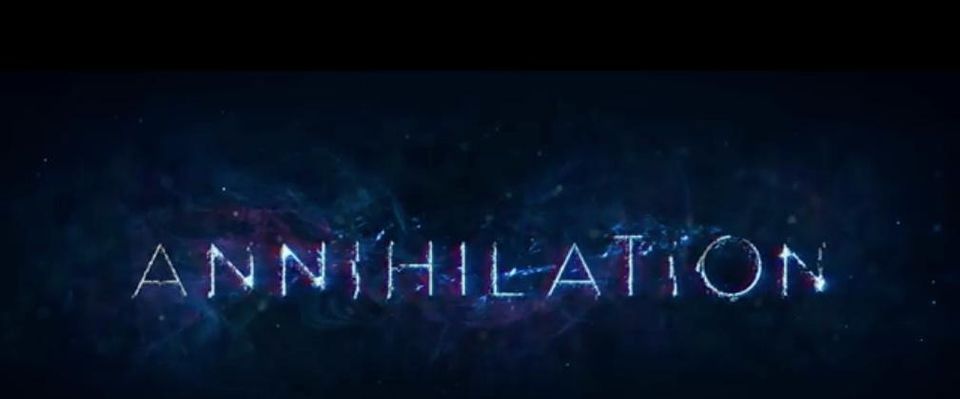
With a strong cast and a fascinating premise, the adaptation of Jeff Vandermeer’s Annihilation has made waves in the science-fiction community. Though the film was given a limited theatrical release before widespread distribution to Netflix (now available) it has nonetheless been considered a successful, if unorthodox, adaptation.
There are remarkable differences between the novel and the movie. Both, however, pose subtle questions about the nature of desire, motivation, and drive. This question lies at the center of both the movie and the book: what does the alien want?
The Movie
The movie stars Natalie Portman as Lena, a biologist suffering from crippling depression after the disappearance of her husband (a special forces soldier) a year before. When he inexplicably shows up at their home, she is ecstatic. When he begins convulsing and coughing up blood, she is terrified. And when the government forces the ambulance they are in to a stop and jams a tranquilizer syringe into her neck- well, then she knows nothing at all.

Lena wakes up in a room so stark and clinical that she wonders if she’s in a mental hospital. There, she is interviewed by a psychologist named Ventress; a key character in both the novel and the movie, though in different ways. Ventress lets Lena in on a secret known to a select few; that an existential threat creeps toward them a few inches a day, swallowing anything that enters. They call it the Shimmer.
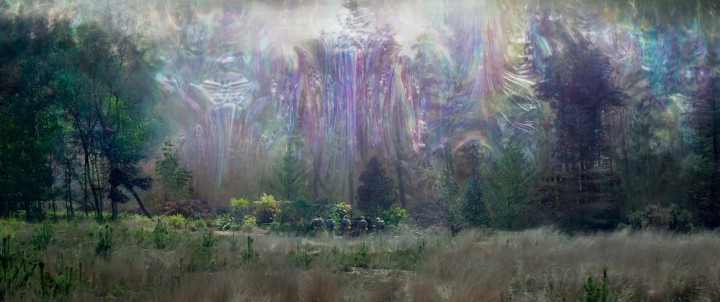
The Shimmer radiates out from a lighthouse that was struck by a meteor several years earlier. From the outside, it looks like a wall of twisted rainbow, swirling and shifting. Teams of researchers, soldiers, and scientists have been entering for years, but only one man has returned: Lena’s husband Kane. Lena asks to see him. He’s held in an on-facility ICU unit with massive internal bleeding. Then Lena learns of another expedition preparing to enter the Shimmer, led by Ventress herself, and decides she wants in. Later, when asked why, she says only, “I owed him. So I went in.”
The new expedition consist of five volunteers, all women: Lena herself, the quiet biologist; Ventress, a blunt psychologist; Sheppard, an introspective anthropologis;. Radek, a young and brilliant astrophysicist; Thorensson, a mistrustful paramedic. They enter the Shimmer and instantly everything goes wrong. They are losing track of time, being attacked by hostile animals, and watching their unity begin to break apart. Eventually, with the anthropologist and paramedic dead, the astrophysicist disappeared, and the psychologist pushing on to the lighthouse, Lena finds herself alone. She follows Ventress to the lighthouse, descending into the cavern created by the meteor’s impact.

There, Lena finds Ventress, and comes face-to-face with the cause of the Shimmer and the deaths of so many; an alien intelligence. It breaks Ventress into her smallest cellular components, using Lena’s blood to create something new- a clone of Lena herself. It first appears as strange as the Shimmer in which it was born, soon taking on her traits and appearance.
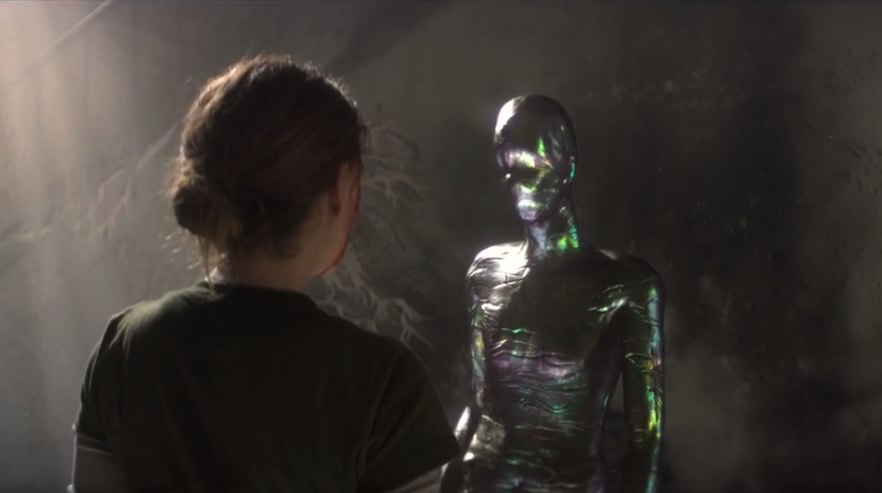
Lena runs, and the creature appears before her. From here it copies her every movement with impossible precision. She punches it, and it returns the blow. She runs for the door, and it follows. The creature doesn’t seem to want anything. It moves only when Lena does.
Eventually, Lena’s panic is replaced with a sense of wary curiosity; after all, she is a scientist before all else. She outsmarts the mimic, pulling the pin on a phosphorus grenade and leaving it in the mimic’s hand. As Lena dives for the door and escapes, the mimic stares at the grenade in its hand and, in a key moment, accepts it.
The grenade ignites and burns both the mimic and the alien infestation in the lighthouse, the Shimmer collapses, and our heroine lives on, forever changed by the nightmarish experiences she has endured.
But the ambiguous ending left viewers asking a seemingly simple question: “What happened?”
The Explanation
Throughout the movie there is ample evidence- and discussion- of the effect the Shimmer has on life within. It blends traits together from vastly different species, literally refracting DNA within its sphere of influence. While this effect is certainly shown in a physical capacity, there is a more subtle aspect to it. The refraction also affects the cognitive functions of the organisms within. When the Shimmer created Lena’s clone, it also copied her mental state; the tendency all humans have to “self-destruct” as Ventress put it.
A major revelation comes in the form of a flashback roughly halfway through the movie: Lena is cheating on Kane with a coworker whenever he is on deployment. The initial image of a loving, idyllic marriage is soon shattered as the cracks begin to show. Why Lena is cheating is less important than the very fact that she is engaging in one of the most human of traits, a major facet of both the movie and the novel: self-destruction.
This is critical. Lena has already destroyed her marriage, entered a dangerous, alien environment, and engaged in a reckless compulsion to reach the lighthouse. She attacked the mimic, wallowing in anger and violence. Self-destruction is written across her entire being.
And it is for this reason that the mimic becomes an accomplice in it’s own destruction. What Lena has done metaphorically, the mimc does in reality: it destroys itself and everything it holds sacred.
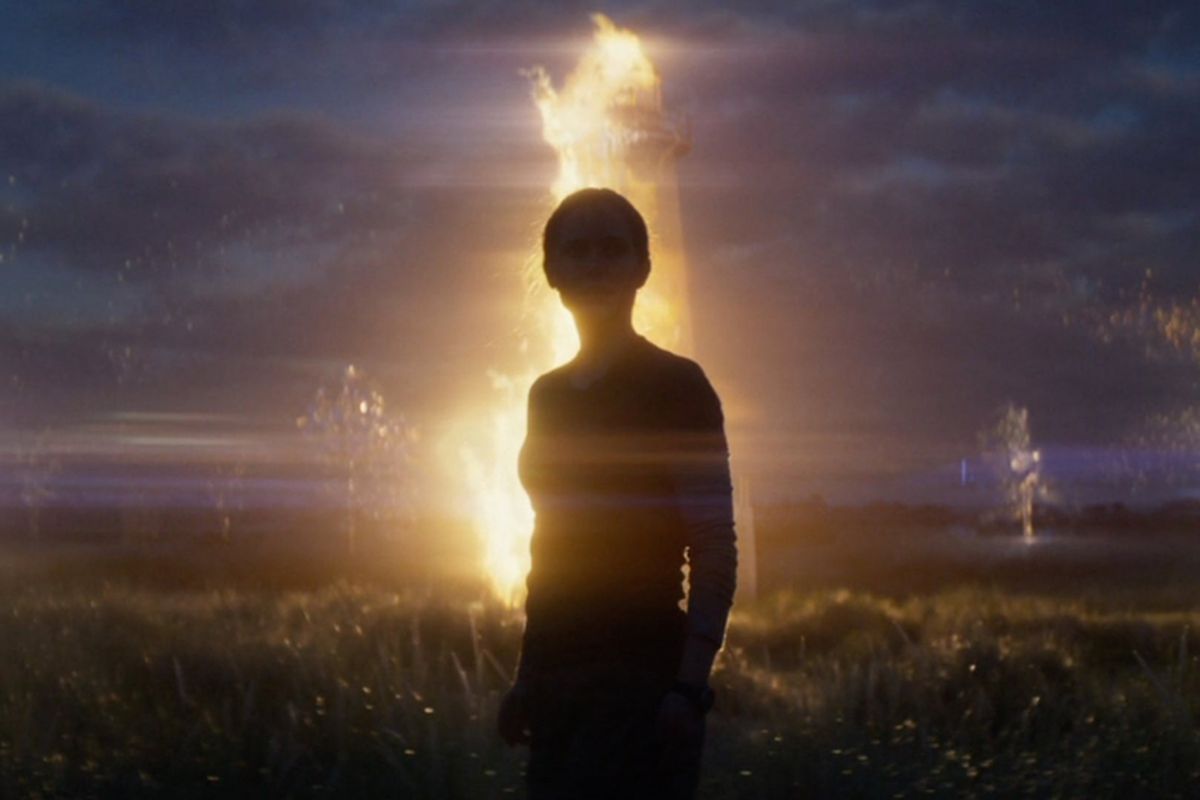
The Novel

The novel version of Annihilation is both entirely different, and incredibly similar. In tone, both versions depict a slow, subtle depression that seeps into the soul of the viewer; a desolate and haunting journey. However, while the plot and ending are somewhat dissimilar, the ultimate message is quite comparable. Annihilation is the first book in a trilogy that is truly stunning.
Both versions display the human tendency to self-destruct. In the novel, the expedition into Area X, (as the Shimmer is called) is much smaller. It consists of only four women, and they are never named; referred to only as “the biologist” (again the main protagonist) the psychologist (who leads the expedition) the anthropologist, and the surveyor. A fifth member, a linguist, was left behind before the expedition entered Area X. It is also shown early on that the psychologist has programmed the other members with hypnotic suggestions, though the biologist is revealed to be immune.
The expedition is given only a few guns (which are locked in a case) journals to record their thoughts, food, tents, and a small black box with a bulb that will blink red under certain mysterious circumstances. The group is not told what causes the box to activate, only that if it does they have a limited time to remove themselves from the area. The rest of the tech they are given is all completely outdated.
The focus of the expedition soon becomes a “Tower” as the biologist calls it, a reverse spiral staircase that burrows deep into the ground. The rest of the group calls it a “tunnel”, but the narrator mentions several times that she is incapable of imagining it as anything other than a Tower.

When the group enters the tower, they discover an endless run-on sentence scrawled into the wall as it spirals down, the content of which is, again, haunting. An example:
“In as calm a voice as I could manage, aware of the importance of that moment, I read from the beginning, aloud: ‘Where lies the strangling fruit that came from the hand of the sinner I shall bring forth the seeds of the dead to share with the worms that…’ Then the darkness took it. ‘Words? Words?’ the anthropologist said. Yes, words. ‘What are they made of?’ the surveyor asked. Did they need to be made of anything? The illumination cast on the continuing sentence quavered and shook. Where lies the strangling fruit became bathed in shadow and in light, as if a battle raged for its meaning. ‘Give me a moment. I need to get closer.’ Did I? Yes, I needed to get closer.”
The group leaves after the biologist inadvertently inhales some strange spores from the vegetation the words are formed from, though the rest of the group is unaware she has done so.

Before long, the surveyor is dead, the psychologist vanished to journey alone toward the lighthouse. The biologist journeys deep into the tower, discovering the body of the surveyor, and realizes that whatever creature is creating the words is extremely dangerous. She calls it “the Crawler”. Trust between the anthropologist and the biologist is shattered after a failed attempt by the biologist to use a hypnotic command on the anthropologist.
By the climax of the novel, the biologist is alone. All other members of the expedition lie dead, one by the biologist’s own hand. She has pushed on to the lighthouse to find immense numbers of journals left by prior expeditions (one of which belonged to her husband) and the psychologist, who somehow fell from the top of the lighthouse and dies shortly after.
Alone, the biologist returns to the Tower and descends until she comes face to face with the Crawler, and the climax of the novel occurs.
Both versions of the story deal with this flaw of human nature, this drive to self-destruct in our lives. Each version of the protagonist are incredibly complex, simultaneously faithful to the other and unique to themselves.
The Question of Desire
As humans, we think we understand abstract concepts like love, fear, and hate. Envy. Desire. But do we truly understand the myriad of subtleties that make these concepts up? There is strong evidence that our views are tainted by the lens of humanity through which we see everything else.
Extrapolate this inherent belief to the stories we create. Take a personal favorite; Battle: Los Angeles. In many ways it is a standard action movie; aliens invade, a small, heroic team goes above and beyond the call of duty, and Los Angelos is saved. A nearly two hour long shoot-em-up fest that is great for melting into the couch and enjoying some mind numbing cinema.
But at no point is the film intellectually stimulating. Nothing lies beneath the surface. Almost immediately, it is heavily implied, (and therefore certain) that the aliens are invading for the purpose of stealing Earth’s water. Snooze. Seen that play out a million times. The film portrays the classic example of an alien menace with motivations that are completely, predictably, human. While the film is still enjoyable, it lacks a deeper meaning.

Now that we have seen the standard method in modern cinema, let’s return to an exception to the rule.
In Annihilation, novel author Jeff VanderMeer and film director Alex Garland both took special pains to avoid falling into this trope. Both the Crawler and the mimic are utterly and truly alien in the respect that they lack a projection of human desire; as the viewer, we don’t know what they want. This is a major plot point in both the movie and the film, as the ambiguity of the alien is a major piece of the immersive whole.
For example.
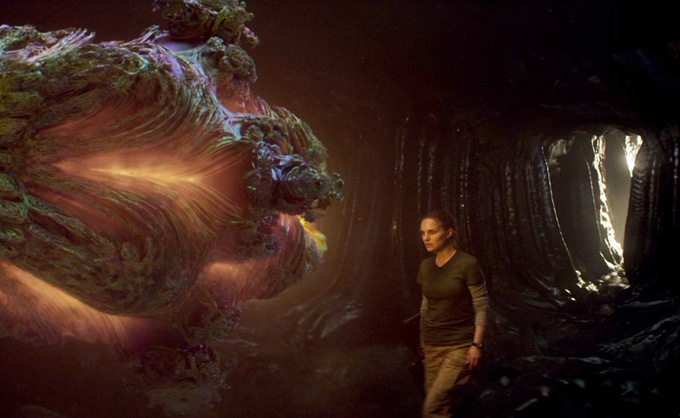
In the movie, the hub of the alien presence itself is confined to the cavern beneath the lighthouse. Sure, its effects are far reaching, and the mimics it creates are seen throughout the Shimmer, (Kane and Lena’s mimics; the white deer) but the true “consciousness” of the alien is fixed in place. At no point does it seem to do anything other than exist. In order for a mimic to be created, the subject must come to the alien, and as often as not this seems to be a random occurrence.
Then there are the mimics themselves. Kane, (who, ironically, seems more pacifistic than his wife) develops a rapport with his mimic, even giving it a message to relay to Lena. The mimic agrees and indeed finds Lena, the event that becomes the catalyst for the entire film. But that desire is not the alien’s, its Kane’s .

When Lena’s mimic first appears, it follows her movements. It shows no goal or motivation of its own. Only after she attacks does it reciprocate. Only because it inherits her nature does it submit to self-destruction.
What sentient creature could evolve to behave in this way? This is a bug, not a feature. It seems to serve little purpose; indeed, it is actually detrimental. This leaves only two possible explanations; one, that the alien is playing a far larger game, and that it’s desires are beyond our comprehension, or two, that it simply lacks desire. The latter is also beyond human comprehension, interestingly enough.
In the novel, the bottom line is quite similar. Why is the Crawler descending ever deeper into the tower? Why is it writing endlessly on the walls? There seems to be no motivation.
The Theoretical
The rabbit hole has led this far already; why not finish it out?
In most fiction- scratch that- all fiction, there must be an antagonist. These crucial elements can take many forms, but they must always be present. However, in most fiction they are personified in a way that is relatable to the viewer; after all, without something that sucks us in to root against, why watch? Annihilation presents a rare, foreign type of antagonist, one that is far less relatable than the average baddie. To many (myself included) this makes the antagonist more interesting and compelling. Something never before seen commands curiosity from novelty alone.
And it isn’t only about us. We are just observers; calculating, uninvolved. It’s the characters who actually have to struggle against this unfathomable entity. How does an antagonist without desire affect a character and their decisions? Such a situation could lead to a myriad of vastly different scenarios, any one of which could make for a fascinating tale.
In the end, the question created by these types of films always seems to be the same. What do we really know?
What do you think? Leave a comment.











I saw the movie, Annihilation, and thought it was OK but nothing special. This essay is better than the movie–good insight.
You give me too much credit, but thank you. I enjoyed the movie very much, but the novel is brilliantly written- worth checking out.
My one issue with the movie is that it was marketed as an action like movie where women battle mutated animals. They basically used the three combat scenes to sell this flick that was far deeper than what the trailer insinuated. Also, what was the deal with the “8” tattoed on the forearms. I noticed it in the dead bodies too? I assume it was from the book but never explained or hinted in the movie—unless i missed it. Please dont let it be something as simple as an infinity tattoo.
It was definitely deeper than they let on pre-release. As far as the tattoo, I believe the original was on Sheppard’s arm, and when it eventually transferred to Lena and the others it was meant to show that the DNA of the expedition was slowly mixing during their time in the Shimmer. They did it in an extremely subtle way.
I agree, but then again, films like this and mother! are difficult to market and encapsulate in a movie. You really just need to go in like, mother!, trusting and know a bit of the writer-directors work rather than depending on trailers.
But that’s just what trailers tend to do. I didn’t feel the Annihilation trailers were misleading; I just assumed they were focusing on the few action/horror scenes. But then I tend to know directors’ histories before seeing their movies, and most people don’t care. The only recent movie I felt cheated me was “Downsizing.” I know, I know . . Alexander Payne’s name should have tipped me off that it wasn’t a wacky comedy about people who shrink themselves. But it went SO far from wacky comedy that the trailers seem to be from an entirely different movie. There was a good, smart comedy there somewhere, but instead I got whatever Downsizing was supposed to be.
I haven’t yet seen Downsizing, and I think you just talked me out of ever trying.
A representation of duality and eternity/infinity… Simply a visual reference forming and evolving along with the themes, perhaps?
MASTERPIECE.
Right?
The movie was brilliant.
Thank you for writing this! I saw the movie like a metaphor for how to overcome marital problems. She was cheating on him so he left her, which forced her to go through a metamorphosis. At the end he says he is not the same person and her eyes changing color seem to indicate she was also a different person.
Thank you for reading it!
And absolutely, not only were they different people mentally, but Kane was literally a different person.
I kind of looked at it on a biological level. Evolutionary, if you will. I looked at it in terms of how a cell grows and changes throughout its life cycle. Lena mentions in the beginning of the movie how all life on Earth could be traced back to one cell. Then there were two, four, and so on. The initial event of the meteor, ship, pod, etc, landing on Earth is like the introduction of that first cell. Those cells then grow and split and so on. Being that there is a Shimmer, everything is refracted, much like Radek said. So as the cells grow, they mirror Earth’s DNA, like a roadmap. But since everything is refracted, the mirror isn’t an exact image. Mutations arise. Lena mentions aging as a genetic flaw. These new cells seem to have surpassed that flaw by merely recreating the same being over and over again. Like the flowers on the dock. It is literally the same flower over and over again, in different life cycles, mutated by the Shimmer. So the flower never actually dies. It is merely born again. The bear, the crocodile, the deer, are all recreations of the same organisms, just mutated. If not for the refraction caused by the Shimmer, these new cells would have likely created beings much like our own. I believe it is about an evolutionary step forward. Just simply thwarted by a misstep, the refraction in the Shimmer. But it’s all about interpretation.
Definitely a solid interpretation of a deep and complicated movie!
This is by far the most interesting explanation to the movie and novel. i have one question though. the mirror lena is set on fire via phosphorous grenade. why didn’t the mirror lena didn’t freak out? it seems more like confused. can somebody explain me that?
I think that in that moment, the mirror Lena is feeing the self-loathing and contempt for herself and her actions that the real Lena has been feeling since before the expedition started, and so as the phosphorous grenade is put in her hand she accepts it as an easy way to end those feelings.
But as another commenter said, it’s definitelu all about interpretation.
my new favorite movie, my old fave was terminator 2 judgement day
The movie is great. Really creeped me out.
Nice to see something conceptual like this without a neat explanation and with a kind of surreal, abstract ending.
The first 2/3rds were pretty dull and slow. But the final 3rd, and the ideas in the film make it worth watching. I thought the final shot was a bit cheesy and unnecessary.
The one of her and Kane’s eyes flashing?
There’s a drinking game to be made out of every time a character refers to ‘the shimmer’ make it a double if there’s a pregnant pause before it is said. Actually don’t, you’ll have alcohol poisoning before a mutant crocodile attacks one of them (Spoilers).
Great article. The film felt fresh and kept me engaged throughout.
Thank you!
Great film that I caught last night. Subtle, scary, exploring some interesting and complex ideas about identity, gender, life… I loved it.
The film is about, among other things, cancer. One of the main protagonists is suffering from terminal cancer, and the shimmer is slowly spreading, distorting everything, it is the representation of Dr. Ventress’ affliction. There are also themes of humanity’s tendency toward self-destruction. It’s a multi-layered piece of work that will be appreciated much more in years to come.
Definitely agree. It’s one of those movies that will need to be chewed on for a few years before it can really take it’s place. It will age well.
the premise is interesting and the film is visually stunning, but it tries embarrassingly hard to be cerebral in a way that’s strictly based on form (like some of the dialogue, or the long, slow, supposedly introspective scenes) without the actual content to back it up beyond throwing a few existential questions at the wall and hoping they stick.
the last third of the film was the worst offender and cheapened the whole endeavor- the ending was clichéd and predictable, for more concerned with tying up all the loose ends and getting it over with rather than actually focusing on the aforementioned existential questions that the film supposedly wanted to tackle.
ultimately it felt like the result of indecision to me – indecision between a sincere exploration of human questionings and fears that would’ve resulted in a far more open-ended & unsatisfying (in terms of traditional narrative) conclusion AND a film that was after all for mass consumption for which the author had to make several compromises in that sense and/or couldn’t fully commit to the original premise.
It’s interesting to read all of the various opinions expressed in the comments; there is a huge divide. People seem either to have loved the movie or hated it. I fall into the former camp, though you make several good points (although the film studio actually downsized the theatrical release; fearing it would bee TOO cerebral and not appealing to a broad audience). Thank you so much for reading, and for expressing your opinion on the film!
I thought the lighthouse scene near the end was fantastic. That almost galvanised entity/doppelganger that materialised from the anus of Hades and the balletic mirroring it was compelled to participate in was a real treat. Portman was brilliant. More of this stuff please Netflix.
“the anus of Hades”. Brilliant. Portman was great in this role, absolutely.
That’s a lovely image. But seriously, it really was a culmination of all the events and one of the best sequences of mainstream cinema in recent years.
I struggled to follow this. And did fall asleep, a couple of times. I will try again. Not sure why. This analysis helps though, so thanks.
It’s definitely a movie that seems to take a place on the fringes. I’ve watched it three times in preparation for this article, and I still haven’t grasped everything. Give it another shot!
& thank you for your feedback, I appreciate it!
As in Ex Machina, Garland’s problem is pacing and plot-drivers. You get to the point when you’re just waiting for the next Awful Surprise to happen. And omitting key scenes when the women are attacked off-screen doesn’t help build tension. Plus, the flashbacks to the relationship between Portman and her husband are just so tedious … obviously there to provide back-story and give her some motivation. (Then, why is she allowed on the team when the other members have been preparing for weeks? Couldn’t they find another biologist to go with them?)
I also found my problems to be with the flashbacks. It is obvious exposition, and I think it could have been woven into the plot in a less intrusive and distracting way. Definitely a key part of the movie though, if clumsily handled.
The flashbacks are to explain her path of self- destruction. All the characters are undergoing self-destruction, which is one of the themes of the film. Although I agree it could have been done in a more interesting way.
It is a mood piece, with themes of separation. It’s not perfect, but I certainly praise it for being interesting, visual, moody, science fiction of the classic school.
I saw it last night and was blown away,I’m still thinking about it this morning.
Awesome write-up. I knew little about the plot before seeing the film and I loved how it me think, question, and re-think things from beginning to end. It truly is a masterpiece, one I’ll never forget. The last sci-fi movie that made me think this much was Prometheus, though I had a slightly easier time digesting that one. This one was a mesmerzing doozy. Great acting and visual effects.
I agree! It was extremely thought provoking and beautifully done. The cast nailed it, the writing was excellent. One to remember.
Excellent analysis of this film and novel.
Thank you!
ANNIHILATION was a beautiful looking film and contained some amazing concepts but at its heart it’s just a more colourful retelling of Tarkovsky’s classic, with a dash of ARRIVAL thrown in for good measure.
I haven’t yet seen Arrival, but I’ve heard excellent things.
I really enjoyed it . Subtle blend of mystery and sci fi, with some body horror that never detracts from the plot . And a haunting sound track with the excellent use of a Moderat track towards the end.
The score was one of the most memorable aspects of the film, they did an excellent job conveying horror and unease with every song choice.
There were elements of all sorts of classic science fiction in the DNA of the story, all combined to create something new…which, while nothing “new” as a technique, gave the story a rather novel and meta quality; A story about an entity creating new material from existing DNA, while demonstrating that very process by creating new film material from exisiting film material.
Perfect analysis. I’d never read anything like the novel, and it is made even better by the rest of the trilogy.
Excellent write-up and I could not agree more. This film/novel is an utterly breathtaking masterpiece of the highest level.
Thank you! It absolutely was.
This movie is about the archontic force that has taken over this reality, the symbolism is blindingly obvious.
What does that even mean?
One of the best films I’ve seen in a while. It is mysterious, moody and scary at times.
The entire film requires you to forgive the flaw in many horror films.
That being the inscrutable nature of the choices made by the protagonists?
I was disappointed, I love Alex Garland’s films but couldn’t really get into it. Not bad but certainly not outstanding.
Proper interesting article. The theory regarding lack of desires is a fascinating one. I reckon it has some untapped depth as a writing device or movie trope (I’d love to be shown other examples where it’s being employed!) It seems like a cunning way to create the possibility of more ambiguous interpretations of characters’ intentions and project our own desires onto the actions of the desire-less. Very nice stuff.
Thank you! And absolutely, the lack of motivation and desire in the antagonist (and even the protagonist, at times) is a device that is both incredibly simple and complex all at once.
Really good and interesting discussion, thank you again for sharing this!
Thank you!
This writing is superb in content as well as imagery. I’ve been a fan of Natalie Portman since watching her and Ashley Judd in “Home is Where the Heart Is” a few years back. I think she can spar with Hollywood heavyweights in any form of the art.
Both are incredibly talented, indeed! Thank you for the kind words.
I really enjoyed Annihilation. It was a bizarre ride through an alien Earth where the rules of nature have been flipped on their head.
Overall I thought the film was generally poorly acted, but the story and world-building kept me enraptured throughout. I’d love to see a successor that continues the plot from the book trilogy.
Both are incredibly talented, indeed! Thank you for the kind words.
I would be interested in seeing that as well.
Great essay, thanks very much. Just watched the movie and read the book this past week and thought they were great. Book is quite a bit different, although I suppose the most important elements are common in both. Both are very thought-provoking mixes of ideas that resist simple interpretation. Although mystery is a wonderful thing, I think a little bit too much was left vague and unresolved. On the whole though, good stuff.
I agree that the alien intelligence (book and movie) doesn’t seem to want anything in a human sense. My interpretation though is that this wasn’t an attempt by VanderMeer or Garland to show a new type of antagonist so much as it was to convey something very important about the human condition.
Consider our own life stories. Who or what is the great “antagonist” in these stories? Other people? Society and its institutions? The forces of nature? Ourselves, in that we must battle our own tendencies toward greed, hatred, delusion, and self-destruction?
In a way it’s all of those and none of those. I would argue that ultimately what we fight is nothing more and nothing less than the unfathomable forces that drive the universe. These forces share many important properties with Area X/The Shimmer: they are powerful beyond comprehension, capable of tearing anyone and anything apart all the way to the most fundamental building blocks, completely devoid of desire or motivation in any recognizable human sense, and capable of creating things that we humans would consider beautiful, horrible, wonderful, and terrifying.
These forces are maybe best characterized by the one thing that never changes, that is, the fact that everything changes. Everything is impermanent. All life ultimately is “annihilated” in that it comes from and returns to the same fabric of existence. In the face of that reality, how should we respond? Try to understand it, like Ventress? Accept it, like Radek? Fight it, like Lena? It doesn’t matter insofar as we’re all annihilated in the end, but those among us who are the wisest (arguably Radek, or perhaps Sheppard in the movie version) are able to find a modicum of peace along the way.
What do you think?